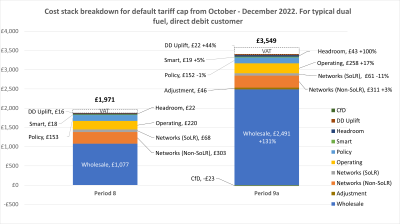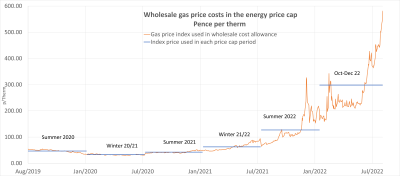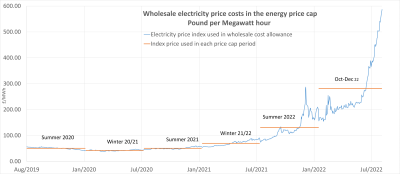Ofgem updates price cap level and tightens up rules on suppliers
- Publication type:
- Press release
- Publication date:
- Industry sector:
- Supply and Retail Market
Related links
- Default tariff cap level: 1 October 2022 to 31 December 2022
- Decision on extending Short-Term Interventions and adjusting MSC calculation
- Consultation on amending the methodology for setting the Earnings Before Interest and Tax (EBIT) allowance
- Decision on statutory consultation on supplier control over material assets
- Decision on statutory consultation on strengthening fixed direct debit rules
Today (26 August 2022) Ofgem has announced the energy price cap will increase to £3,549 per year for dual fuel for an average household from 1 October 2022.
This comes as Ofgem’s CEO warns of the hardship energy prices will cause this winter and urges the incoming Prime Minister and new cabinet to provide an additional and urgent response to continued surging energy prices.
The new price cap level is based on a transparent methodology and calculations by Ofgem. The data is published on the Default tariff cap level: 1 October 2022 to 31 December 2022 publication.
The increase reflects the continued rise in global wholesale gas prices, which began to surge as the world unlocked from the Covid pandemic and have been driven still higher to record levels by Russia slowly switching off gas supplies to Europe.
The price cap, as set out in law, puts a maximum per unit price on energy that reflects what it costs to buy energy on the wholesale market and supply it to our homes. It also sets a strict and modest profit rate that suppliers can make from domestic energy sales. However, unlike energy producers and extractors, most domestic suppliers are currently not making a profit.
The price cap protects against the so called ‘loyalty premium’ where customers who do not move suppliers or switch to better deals can end up paying far more than others. Ultimately, the price cap cannot be set below the true cost of buying and supplying energy to our homes and so the rising costs of energy are reflected in it.
Although Ofgem is not giving price cap projections for January because the market remains too volatile, the market for gas in Winter means that prices could get significantly worse through 2023.
Jonathan Brearley, CEO of Ofgem, said:
“We know the massive impact this price cap increase will have on households across Britain and the difficult decisions consumers will now have to make. I talk to customers regularly and I know that today’s news will be very worrying for many.
“The price of energy has reached record levels driven by an aggressive economic act by the Russian state. They have slowly and deliberately turned off the gas supplies to Europe causing harm to our households, businesses and wider economy. Ofgem has no choice but to reflect these cost increases in the price cap.
“The Government support package is delivering help right now, but it’s clear the new Prime Minister will need to act further to tackle the impact of the price rises that are coming in October and next year. We are working with ministers, consumer groups and industry on a set of options for the incoming Prime Minister that will require urgent action. The response will need to match the scale of the crisis we have before us. With the right support in place and with regulator, government, industry and consumers working together, we can find a way through this.”
Ofgem will continue to work with government, consumers groups, charities and suppliers, in supporting any new package of help or measures to ease the crisis.
Ofgem has also today strengthened the rules around direct debits to ensure suppliers set them at the right level, meaning that customers only pay exactly what they need to. The changes will stop suppliers from building up excessive customer credit balances and using them in a risky way as working capital.
Ofgem’s clear role is to protect consumers, and it has also today:
- Strengthened requirements for suppliers to have sufficient control over the key assets they use to run their businesses. Together, this and the direct debit rule changes build on existing requirements to boost supplier resilience to better protect customers from costs associated with supplier failures.
- Extended the Market Stabilisation Charge (MSC), which is paid by suppliers and helps protect customers from the cost of supplier failure.
- Extended the ban on acquisition only tariffs which ensures all energy tariffs are available to existing as well as new customers, ensuring all consumers can get a fair deal on their energy.
- Launched a review into the mechanism and level of profit margin available under the price cap to ensure that suppliers do not earn excessive profits and receive only a fair return for the services they provide to customers.
The new price cap level will take effect from 1 October 2022, but it is possible some suppliers may begin increasing direct debits before this date to spread costs. Customers worried about when their direct debit will increase should contact their supplier. Any money taken from customers to build up a credit will only ever be spent on their energy supply and customers can ask for their credit balance to be returned at any time.
Anyone worried about paying their bill should contact their supplier in the first instance. They are obliged to discuss payment plans and direct customers to government and third sector support where available. Ofgem is tightly monitoring suppliers’ performance in this area and has told all suppliers now is the time to step up their support for customers, especially those on low incomes or in a vulnerable situation.
Ofgem continues to monitor the impact of the price cap and to work with stakeholders and government on what more can be done for those least able to pay but most in need of energy. When the new Prime Minister announces what additional support packages will be available, Ofgem will continue to examine how best it can help those groups of people that need it the most.
Notes to editors
1. Help available for customers:
- If customers are struggling to pay for energy bills, they should contact their energy supplier as soon as possible. Depending on their circumstances, customers may be eligible for extra help with their energy bills or services, such as debt repayment plans, payment breaks, emergency credit for prepayment metered customers, priority support and schemes like the Winter Fuel Payment or Warm Home Discount rebate.
- Support available: Energy domestic consumer advice for Autumn/Winter 2022 | Ofgem
- Breathing Space Scheme: This is a scheme to give households time to receive debt advice and find a solution to sort out their debt problems. Breathing space will last for 60 days as long as applicants remain eligible during which time all creditors who have been included will be informed and must stop any collection or enforcement activity. Once the breathing space ends, creditors will be able to collect the debt in the usual way. Consumers can call the National Debtline on Freephone 0808 808 4000 or visit www.nationaldebtline.org
- The Citizens Advice consumer service can provide advice on how customers can resolve problems with their energy provider. You can contact Citizens Advice via webchat, or by calling 0808 223 1133. For complex or urgent cases, or if a person is in a vulnerable situation, they may then be referred onto the Extra Help Unit.
- Advice Direct Scotland has a range of services to support Scottish consumers who are struggling, including advice and information on basic or complex energy inquiries, supplier complaint processes and support with understanding energy bills. You can contact Advice Direct Scotland via Live Chat, by calling 0808 196 8660 or by email.
2. Published cap levels for the charge restriction period 9A of the default tariff cap: 1 October 2022 – 31 December 2022.
Section 5 for future price cap dates: Check if the energy price cap affects you | Ofgem
3. The price cap protects around 24 million households on default or variable rates on credit meters. The £3,549 per year level of the cap is based on a household with typical consumption on a dual electricity and gas bill paying by direct debit and, following the recent 4 August announcement, will be updated on a quarterly basis. More information on this can be found on the "Ofgem confirms changes to the price cap methodology and frequency ahead of new rate to be announced later this month" press release. Customers who pay by standard credit (cash or cheque) pay an additional £215 based on the higher cost for energy companies to serve them. The 24 million households protected by the price cap includes around 4.5 million prepayment meter customers. These customers pay an additional £59 compared to those on direct debit, which also reflects the higher cost for energy companies to serve them. The values shown in the text above include VAT and are expressed for the current Typical Domestic Consumption Values (TDCV) of 2,900kWh of electricity, 12,000kWh of gas, and 4,200kWh of electricity for Economy 7. The price cap is a cap on a unit of gas and electricity, with standing charges taken into account. It is not a cap on customers’ overall energy bills, which will still rise or fall in line with their energy consumption. From 1 October the equivalent per unit level of the price cap to the nearest pence for a typical customer paying by direct debit will be 52p per kWh for electricity customers and a standing charge of 46p per day. The equivalent per unit level for a typical gas customer is 15p per kWh with a standing charge of 28p per day.
4. Breakdown of costs in the energy price cap
Dual fuel customer paying by direct debit, typical energy use (GB £)
5. The charts below shows indexed wholesale prices from cap period 4 (summer 2020) to cap period 9a (Oct – Dec 2022). Wholesale costs make up the majority of a customer’s bill.
Prior to October 2022 update – we observed wholesale prices for future delivery over an indexation period. This was carried out twice a year, from the preceding February to August for the winter period (October - March) and from September to January for the summer period (April - September). The fixed horizontal lines show the average wholesale cost allowance for each 6 month price cap period based on the price of the relevant forward looking energy contracts (the jagged line).
From October 2022 - As set out in our 4 August decision document, the October 2022 wholesale allowance calculated within the price cap uses a transitional approach to price indexation compared to previous periods as such they are not directly comparable.
From April 2022 we will determine the wholesale cost allowance within the price cap four times a year, based on the price of the forward-looking energy contracts over the previous three months.
The fixed horizontal line representing the August update, October - December 2022, shows a weighted average wholesale cost allowance for the first 3 month price cap period based on the price of the relevant forward looking energy contracts and number of observed trading days (the jagged line).
Wholesale gas price costs in the energy price cap
Wholesale electricity price costs in the energy price cap
Data sets behind these graphs are proprietary and can be sourced from ICIS.
6. Current government support available for consumers:
- Energy Bills Support Scheme: millions of households across Great Britain will receive a £400 non-repayable discount on their energy bills from October this winter.
- Warm Homes Discount: a £150 Warm Homes Discount will also begin to be paid to 3million low-income households from October.
- Households most in need will be eligible for further support in addition to the Energy Bills discount. This includes:
- £650 one-off Cost of Living Payment for around 8 million households on means tested benefits;
- A one-off £300 Pensioner Cost of Living Payment for over 8 million pensioner households to be paid alongside the Winter Fuel Payment;
- A payment of £150 for around six million people across the UK who receive certain disability benefits;
- A £500 million increase and extension of the Household Support Fund.
7. Information and materials for consumers about the price caps is available at: www.ofgem.gov.uk/energy-price-caps. Information on support and advice for consumers worried about paying their bills is available at: http://www.ofgem.gov.uk/help-with-bills
Media enquiries
Please email press@ofgem.gov.uk or 0203 263 9996.
General enquiries (non-media)
If you are an energy customer looking for help and advice, including complaints about energy firms, please see our Household gas and electricity guide. Citizens Advice also provide a free, impartial helpline service across a range of issues on 0808 223 1133.
We also regularly share news and post general advice to help consumers get the most out of their energy services via our @Ofgem twitter and Facebook pages. If you have an enquiry or complaint relating to Ofgem’s policies or functions, contact us at consumeraffairs@ofgem.gov.uk or on 020 7901 7295.
For all other non-media related enquiries, please visit our Contact us page.
About Ofgem
Ofgem is Britain’s independent energy regulator. Our role is to protect consumers now and in the future by working to deliver a greener, fairer energy system. We do this by:
- Working with Government, industry and consumer groups to deliver a net zero economy at the lowest cost to consumers.
- Stamping out sharp and bad practice, ensuring fair treatment for all consumers, especially the vulnerable.
- Enabling competition and innovation, which drives down prices and results in new products and services for consumers.
Related links
- Default tariff cap level: 1 October 2022 to 31 December 2022
- Decision on extending Short-Term Interventions and adjusting MSC calculation
- Consultation on amending the methodology for setting the Earnings Before Interest and Tax (EBIT) allowance
- Decision on statutory consultation on supplier control over material assets
- Decision on statutory consultation on strengthening fixed direct debit rules


